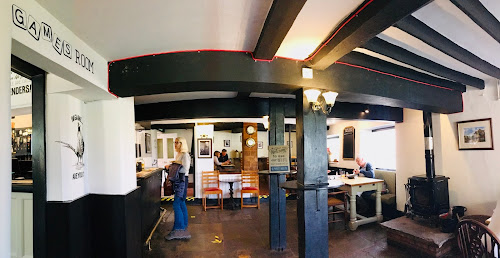 |
 The Brass Lifters on this old Shove Ha'penny Board are located snugly in the grooves which separate the nine beds of the playing surface. Hinged on the left-hand side, and protruding a little on the right so they can be easily lifted during play. Lifters like these are not actually necessary for the game, so what are they there for?
The Brass Lifters on this old Shove Ha'penny Board are located snugly in the grooves which separate the nine beds of the playing surface. Hinged on the left-hand side, and protruding a little on the right so they can be easily lifted during play. Lifters like these are not actually necessary for the game, so what are they there for?The rules of Shove Ha'penny are simplicity itself. The only possibility for uncertainty and disagreement is in the lay of the coins, which must lie squarely and clearly between the lines to score. The general rule during a game is that if there is any uncertainty about the coins position between the lines, then it isn't a scorer, but on some boards this can be easier to judge than on others, and therein lies the potential for disagreement.
The lifters are used to help determine whether a coin is a scorer or not. If when lifted a little way clear of the playing surface, the Brass strip can be seen to move a potentially scoring coin, it is clearly and irrefutably deemed to be a non-scorer.
Brass Lifters, of the type seen on this board are quite common on Shove Ha'penny Boards, even some modern examples come equipped with a set. It's perhaps safe to say that they are most usually found on more expensive models, and since the system is hard to replicate on a home-made board they are generally considered to be an optional extra.
This solid wood board appears to be quite an old one, with a beautifully smooth surface, a Copper surround to stop over hit coins, and a dark patina on the leading edge from many years of use by beer and tobacco stained hands. Unusually, two separate wooden rails have been firmly fixed to the edges of the board to chalk the scores during a game. The main picture above shows the board in use at The George, Ashley, in Northamptonshire, a fine way to spend a cold Winter afternoon with friends.

















































